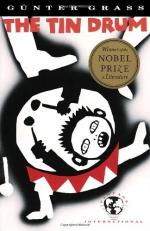|
|
The Tin Drum Chapter 2: Under the Raft
The chapter opens back in the mental institution. For the first time in the novel, Oskar mentions his tin drum, which he claims is responsible for his remembering of all essential past events. Oskar says:
"If I didn't have my drum, which, when handled adroitly and patiently, remembers all the incidentals that I need to get the essential down on paper, and if I didn't have the permission of the management [of the mental institution] to drum on it three or four hours a day, I'd be a poor bastard with nothing to say for my grandparents." Chapter 2, pg. 25
Oskar says that his drum tells him that it was that afternoon, under Anna's four skirts, while the two constables searched, that his mother, Agnes Koljaiczek (Matzerath) was begotten by Anna and Joseph Koljaiczek. Late that night the two are married after Vincent Bronski, Anna's brother, bribes a priest with a side of bacon to perform the ceremony. They then move away to the coast, where Koljaiczek finds work as a raftsman.
Oskar adds that his mother, throughout her life, denied that she had been begotten in a potato field. She admitted that Koljaiczek had "done his best" under the four skirts, but that their position was not conducive to conception. She maintained that it must have happened later that night, at some other more favorable location, after the two were in her brother's care. Anna would always nod and agree with her daughter, saying this it couldn't have happened in the potato field, because it had been too windy and rainy on that day.
Vincent Bronski is a widower living on a farm in Kashubia. Since he returned from a pilgrimage to Czestochowa (a place where the Virgin Mary was sighted) he has been obsessed with coronating the Virgin Mary as the Queen of Poland, finding proof for her claim to the throne in everything he reads. He has a son, Jan Bronski, whom Oskar describes as a sickly child always on the verge of tears. His job on the farm is to tend the geese. Jan collects little colored pictures and stamps. He is four when Anna and Koljaiczek arrive.
Once married, Anna and Koljaiczek flee in Vincent's horse-driven boxcart to the sea. In Danzig, the provincial capital, Koljaiczek remains in hiding for three weeks. He assumes the identity of a little-known raftsman named Joseph Wranka, who had drowned. He changes his hair, shaves his mustache, gives up his pipe for tobacco chewing, gets the necessary identification papers, and becomes a raftsman himself. Oskar then explains his grandfather's need to flee: he had gone to work in a sawmill and had gotten into a quarrel with his boss over a fence that Koljaiczek had painted white and red. The boss had ripped off two slats and hit Koljaiczek in the back, then broken the fence to pieces. Then Koljaiczek had set fire to the sawmill. This set off a rash of copycat acts of sawmill arson and fed growing Polish national sentiment - all acts were committed in the name of the Virgin Mary.
Topic Tracking: Individuality/Identity 2
Topic Tracking: Red & White 1
The disguise worked for Koljaiczek/Wranka until August 1913, when, like every other summer, he took on a job manning the "big" raft down the river. Timber was to be bought along the way, and a new sawmill manager was placed on board to oversee the buying. When introduced, Koljaiczek was suspicious that the supervisor knew that he was Koljaiczek and not Wranka. The tension between the two grew throughout the voyage, though neither one spoke of the suspected arson charge. The supervisor returned to Danzig early via train, and because of his lingering suspicion, asked the local police to open an investigation.
The police obliged, overlooking Wranka's military record, which was flawless, and of Koljaiczek, who had been disciplined for twice shouting anarchist slogans while drunk. Anna and Vincent were questioned; Anna's defense was that Wranka, far from being an arsonist, had been a member of the local fire department since 1904 (which was true). Slowly evidence against Koljaiczek was amassed from sawmill workers and raftsmen; disguised as fishing boats, the police began to shadow Koljaiczek's raft, which was still on its trek down the river. It took several days for Koljaiczek to notice the police, but even once he understood, he did not flee. Then, at Schichau, during a christening of a ship named the H.M.S. Columbus, the police cordoned off the river. At that moment, Koljaiczek's "old incendiary heart" awoke - Oskar says he "sloughed off" Wranka's skin - the water was covered shore to shore with rafts and logs, and so he fled barefoot over the water, jumping from raft to raft and log to log toward the town. Then he was blocked by two launches of celebrating people and forced into the water, where he swam toward shore. But then he was forced to dive - Oskar says:
"But he has to dive on account of the launches and he has to stay under on account of the launches, and the raft passes over him and won't stop, one raft engenders another: raft of thy raft, for all eternity: raft." Chapter 2, pg. 36
Koljaiczek's body was never found. Oskar says that he has no doubt that his grandfather drowned there under the raft, although several alternate versions of the story exist, where he lives either to be taken on by Greek sailors or Swedish fishermen. Another version states that Koljaiczek was seen after WWI in Buffalo, New York, calling himself Joe Colchic, where he had become a millionaire and a major stockholder both in match factories and fire insurance companies.




